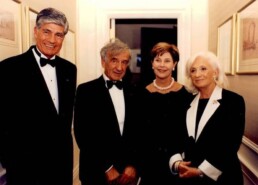Past Work
Conferences
The international conferences of The Elie Wiesel Foundation for Humanity serve as a catalyst for change and action. The conferences, which focus on themes of Peace, Education, Health, the Environment and Terrorism, serve as a way to bring together Nobel Laureates and world leaders to discuss social problems and develop suggestions for change.
The Conferences are part of The Elie Wiesel Foundation’s goal of creating a world in which atrocities such as the Holocaust, the genocide in Rwanda and Darfur and ethnic cleansing are never forgotten, but also, never repeated.
The Foundation hosted its inaugural conference, Facing the 21st Century: Threats & Promises, in Paris, 1988. The program was co-hosted by President Mitterrand of France and was an unprecedented meeting of more than seventy Nobel Laureates from five continents. Laureates in Peace, Chemistry, Physics, Literature Economics, Physiology, and Medicine discussed the theme. Diverse and often complementary perspectives were brought to a variety of shared concerns, from disarmament and human rights to the social implications of technological advances.
On the day before the conference began, which was the 43rd anniversary of the evacuation of Auschwitz, Elie Wiesel traveled to Poland to visit the site of the death camp, accompanied by a group of Laureates and friends.
This conference set the tone for the importance of open-minded dialogues and helped to pave the way for future convocations.
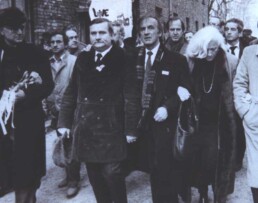
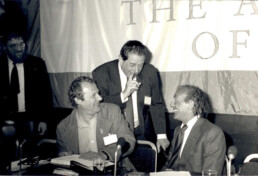
Beyond Hate, the first conference in the “Anatomy of Hate” series, was co-sponsored by Boston University. The seminar-style conference gave scholars, writers and theologians an opportunity to think collaboratively about ways of achieving greater understanding among different ethnic and religious groups.
The participants focused on five aspects of hate: Religion and Hate, Dangers of Hate, Understanding Hate, Diminishing Hate, and Conflict Resolution. “Nationalism and Hate” by Connor Cruise O’Brien, “Hateful Violence” by Robert Jay Lifton, and “Muting Hate” by Jerome Kagan were just a few of the remarkable papers presented.
Education Against Hate: An Imperative for Our Time was an international conference for educators that brought together Israeli Arabs and Jews. Co-sponsored by Haifa University of Haifa, its purpose was to develop a conceptual framework for transcending decades of fear and mistrust, and to confront the complex issues and challenges involved in this task.
Israel was a particularly appropriate setting for a conference of this nature because it has suffered for many years from a violent conflict between Jews and Arabs, a conflict that has been accompanied by bloodshed, anxiety and despair, agony, and feelings of hatred on both sides.
At the time of the conference, hope for human understanding and for a reduction in the danger of nuclear war was tempered by daily news of hatred and violence. Participants agreed that the costs of hatred are too high for the subject not to be a priority for humankind. A focus on education has the potential for advancing the humane evolution of society. At its best, education promotes humane values. Therefore, it is essential to consider the role education can play in reducing hate among people.
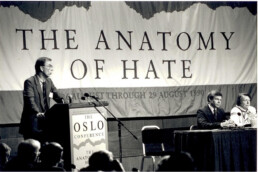
The Anatomy of Hate: Resolving Conflict Through Dialogue and Democracy was convened by the Foundation and the Norwegian Nobel Committee. Former political prisoners and statesmen, writers and scholars from thirty countries – among them Vaclav Havel, Nelson Mandela, Francois Mitterrand, and Jimmy Carter – discussed ways of living with ethnic and national conflict and managing regional tensions through dialogue.
A transcendent moment occurred when South African Deputy Minister for Foreign Affairs Leon Wessels spoke to an audience that included a recently freed Nelson Mandela of desiring “real justice in our land,” of wanting to “cast off the apartheid albatross.”
Mandela, who was later to become President of South Africa, said in response, “We shall endlessly challenge the infamous seeds of hatred wherever these are found. This is the spirit in which we have come to Oslo. The spirit which has sustained us during the many lonely years of our imprisonment. The spirit which will form the basis of our new society.”
“To hate is to refuse to accept another person as a human being, to diminish him, to limit your own horizon by narrowing his, to look at him – and also at yourself – not as a subject of pride but as an object of disdain and of fear…” — Excerpt from The Oslo Declaration
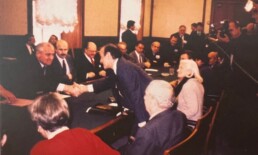
The Anatomy of Hate: 50 years After Hitler’s Germany Invaded the USSR, was convened by the Foundation and Ogonyok magazine. This conference, occurring just days before Soviet President Mikhail Gorbachev’s resignation, was attended by heads of state, legislators, scholars, educators, journalists and human rights activists. Its goal was to find new ways of dealing with those conflicts inherent in the transition from totalitarianism to democracy.
Conference Statement:
“In pursuit of justice for all people, the international conference of The Anatomy of Hate urgently called on leaders and citizens of the world to combat the alarming resurgence of racism, and religious and ethnic hatred.
As individuals, as communities, as nations, we are interdependent and share a collective responsibility to ensure that peoples of all countries, races and religions are guaranteed the full range of human rights that are at the heart of freedom and dignity.
Hatred leads to war. We must disarm hatred to assure peace. Denunciation of hatred is an act of global patriotism. Remaining silent undermines everyone’s freedom and endangers humanity…”
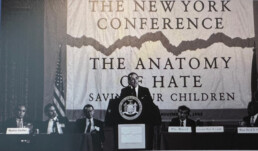
The Anatomy of Hate: Saving Our Children, organized by the Foundation and Governor Mario Cuomo, brought together a distinguished group of educators, psychiatrists, lawyers, theologians, scientists and others to identify and attempt to minimize those ways in which hate affects the lives of our children. Numerous recommendations were put forth, and a single theme was sounded again and again: strong, affirmative models can play critical roles in developing ethical standards in the individual and the community.
“Hate knows no frontiers, neither racial nor ethnic. Hate is contagious. Wearing various masks, it can be found among all religious and social communities. Like cancer, if unchecked, it will destroy the body which nurtures and carries it. Ultimately hate is both destructive and self-destructive. Hate inevitably leads to self-hate…We are coming to the end of the millennium. We are coming to the end of a terrible century, the bloodiest century that has gone from Sarajevo to Sarajevo. Everything in between is commentary… So what do we do with our memory, our trauma? Can we turn it into generosity? Can we embrace the children of others as our own?”
– Elie Wiesel
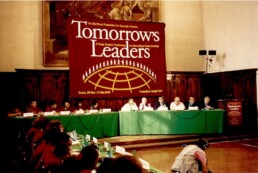
The Elie Wiesel Foundation for Humanity sponsored a conference in Venice, Italy that brought together outstanding young people from five regions of the world – Bosnia-Herzegovina, Northern Ireland, the Middle East, Africa and the United States. The youth worked with experienced facilitators and experts to examine the meaning of democracy and the roots of disputes outside their own regions as well as at home. Conference participants explored such issues as: Are there common threads among ethic conflicts in different parts of the world? How does the hopelessness born of poverty and illiteracy contribute to the appeal of violence and fanaticism for young people? The Venice Conference provided young leaders with a chance to learn from those who have shaped the policies that replaced fear with hope.
Thirty teenagers from crisis areas around the world gathered in Venice. In the course of eight days, during formal and informal discussions, among themselves and with world leaders, these young people attempted to break down the barriers of hatred and misunderstanding that have plagued their lands for hundreds of years. Their voices echo the hopes and fears of young people throughout the world and across the ages.
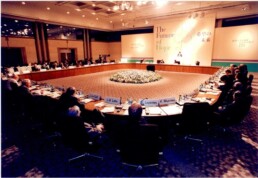
Marking the conclusion of the World War II commemorations and the approaching end of the twentieth century, “The Future of Hope” was co-sponsored by The Elie Wiesel Foundation and The Asahi Shimbun, Japan’s largest circulating newspaper. The goal of the conference was to remind the international community of its moral obligation to safeguard the destiny of future generations
World leaders, Nobel Laureates, eminent writers, scientists, physicians, and opinion and business leaders discussed the role of government and culture in the creation of societal hope, democracy and the proliferation of nuclear arms, and the advent and importance of the age of technology. Through intense dialogue and debate which reflected the experience of the past and fears for the future, the Hiroshima conference put forth a declaration that offers the hope of a more humane world order for the twenty-first century. Participants included President Vaclav Havel, President Jimmy Carter, President Nelson Mandela, President Oscar Arias Sánchez, President Shimon Peres, Ted Koppel, and Arthur Gelb.
The Elie Wiesel Foundation, in association with Boston University, brought together 40 outstanding young people from across the nation to take part in a conference to discuss the challenges faced by today’s youth. The conference focused on ways to become more effectively engaged in their community and to motivate others to move from indifference to action. At the conference, participants considered potential strategies by which education, media and politics could be used to advance youth development, in conjunction with the importance of respect for ethnic and religious diversity.
The Elie Wiesel Foundation for Humanity believes in nurturing new generations. We believe the Conferences for Tomorrow’s Leaders inspired young people to build a better, more harmonious and humane world.
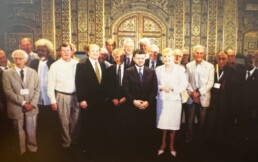
Co-hosted by The Elie Wiesel Foundation and His Majesty King Abdullah II of the Hashemite Kingdom of Jordan, the first of this series of Conferences bring together Nobel Laureates of Peace, Economics, Literature, Physics, Chemistry, Physiology & Medicine with distinguished social and political leaders. The ancient stone-carved city of Petra, a powerful expression of human creativity and ingenuity, serves as a dramatic and inspiring setting for the Conferences.
The first Petra Conference focused on the role of education in combating global injustice. Among the accomplishments of the Conference was the development of The Nobel Laureates Initiative, a collaboration of Nobel Laureates working together to fight indifference, intolerance and injustice.
As Elie Wiesel noted, “We must harness our rich human potential in service of peace, progress and prosperity. To these ends, peoples must realize that no one is superior to another. No nation is worthier than another. No religion is holier than another. Racism, ethnic discrimination and religious fanaticism lead to antagonism, not salvation. I fear that humankind is on a train hurtling towards an abyss. Unless we pull the alarm, it may be too late. It is time to show the world that we can restore humankind’s dignity, its hope and future.”
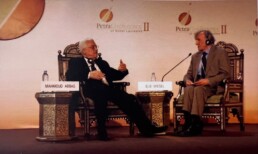
The historic meeting of Israeli Prime Minister Ehud Olmert and Palestinian Authority Chairman Mahmoud Abbas took place at the Foundation’s second annual Conference of Nobel Laureates in Petra on June 22, 2006. Olmert and Abbas addressed the conference and also met privately, after which they announced plans for a formal summit.
Petra II provided a forum to reflect on both old and new problems and proposed novel strategies for transforming challenges into opportunities. Plenaries and parallel breakout sessions focused on non-proliferation, education, health, Middle East peace, poverty and economic empowerment.
The non-proliferation plenary focused on the need for more effective measures to control nuclear stockpiles and create disincentives to uranium enrichment and reprocessing of weapons grade material.
The education plenary centered on developing greater access to universal primary education and better quality education. Discussions focused on gender parity and internet access as top priorities to closing the knowledge gap between developed and developing countries.
The health sessions targeted infant mortality and the vulnerability of women in the developing world. Many children die from inadequate sanitation and water borne diseases, lack of clean drinking water and because they do not have access to vaccinations. The resulting public health crisis devastates lives, productivity and creates fertile ground for civil conflict.
Poverty and economic empowerment plenaries and discussions focused on not only the human suffering aspect of poverty, but also poverty as a source of instability creating potential breeding grounds for violent political expression and fanaticism.
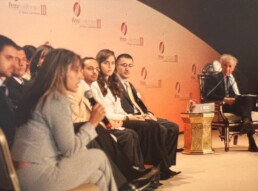
Thirty-four Nobel Laureates participated in Petra III: Building a Better World, the third annual conference of Nobel Laureates convened by The Elie Wiesel Foundation for Humanity and the King Abdullah II Fund for Development in Petra, Jordan, on May 15-16, 2007.
In his address, Elie Wiesel framed Petra III’s mission. “Is it possible,” he asked, “to transcend religious beliefs for the sake of peace? Can national loyalty and ethnic allegiance become creative links rather than instruments of suspicion, hatred and death? What is the role of culture, economy and science, and above all education, in today’s and tomorrow’s society? How are we to survive and flourish at the very edge of the abyss?”
At the previous two Petra conferences, the participants mapped issues and explored possibilities. Petra III was different in that it was more results-oriented. Regional representatives and other distinguished political, corporate and cultural personalities joined with the Laureates in working groups to explore ways of engaging and harnessing their vast expertise in practical ways in the areas of education, economy, health and environment.
Petra III also focused on youth in the Middle East. Students from Israel, Jordan, the Palestinian territories, Egypt, Kuwait, Lebanon, Morocco, and Saudi Arabia attended the conference. The youth participants discussed their hopes and dreams for the future, the benefits of regular interaction between students from the region, and challenges they face.
The conference endorsed the Middle East Science Fund, established by The Elie Wiesel Foundation and the King Abdullah II Fund, in order to support (i) science education activities, (ii) meetings of scientists, (iii) joint scientific research, and scientific exchanges/scholarships that transcend national borders to foster shared benefits in order to improve human welfare and, in the process, reduce distrust.
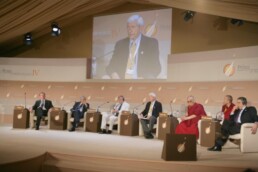
Petra IV: Reaching for New Economic, Scientific and Educational Horizons, took place on June 17-19, 2008 under the auspices of The Elie Wiesel Foundation for Humanity and the King Abdullah II Fund for Development. Leading figures in international finance, science, media, culture and education joined 29 Nobel Laureates to explore some of the most pressing issues confronting the Middle East and the world.
A major session of Petra IV, featuring Nobel Peace Laureates the Dalai Lama, David Trimble, and Elie Wiesel focused on the topic “The Hunger Crisis – Securing the World’s Food.” “Those of us who were never hungry will never understand hunger,” declared Elie Wiesel. “Hunger brings humiliation. The hungry person thinks of bread and nothing else. Hunger fills his or her universe. His prayer, his aspiration, his hope, his ideals are not lofty: they are a piece of bread. To accept another person’s hunger is to condone his or her tragic condition of helplessness, despair and death.”
The two other plenary sessions at Petra IV were “Transforming the Global Economy – Bridging the Gap”, in which participants focused on the ever increasing globalization of the world’s economy, the continuing gap between developing and developed countries, and the challenges facing poorer nations; and “Media – A Force for Change”, in which prominent journalists from the United States, Israel, and the Arab world discussed changing media trends and the challenges inherent in the responsible presentation of the news. The Conference participants also took part in brainstorming sessions on education; medicine, science and technology; arts and culture; energy; and economic development.
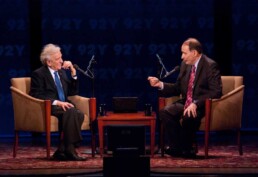
The Foundation hosted a Conference of Nobel Laureates in partnership with the 92nd Street Y. Laureates from various disciplines joined with leaders from the corporate and media worlds to discuss topics ranging from the economic outlook to the situations in Iran and the Middle East. Israeli Ambassador Michael Oren joined the proceedings via Skype and closing the program, David Axelrod, Senior Advisor to President Obama, shared the Y’s main stage with Professor Wiesel for an evening of information conversation, reviewing some of the topics discussed at the conference.
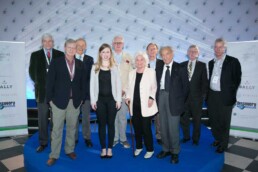
The intensive Conference of 40 International Junior and Senior college students focused on themes of ethics and responsibility. The goal of the Conference was for prominent international personalities, including Nobel Laureates, government leaders, writers, scientists, artists and journalists, to explore ethical dimensions and connect with the power of young people. The themes and topics of lectures, breakout sessions and films or workshop presentations included: bearing witness through storytelling, developing a strong ethical compass, transcending trauma, and taking responsibility for one another. The week-long conference was a great success through its vast discussions on the role of ethics in today’s technologically- advanced world.
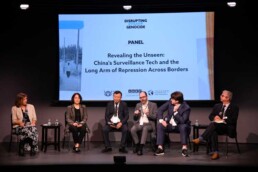
In 2024, the Foundation convened the Disrupting Uyghur Genocide interfaith conference in New York City, co-hosted with the World Uyghur Congress and the Uyghur Human Rights Project. The gathering brought together faith leaders, scholars, and advocates to raise international awareness of the mass detention, cultural erasure, and systemic repression of Uyghurs in the Xinjiang Uyghur Autonomous Region of China.
In 2023, the Foundation awarded grants to Uyghur-led organizations, including the World Uyghur Congress, Uyghur Human Rights Project, and Ana Care, to advance advocacy, documentation, policy engagement, and cultural-preservation efforts.
Past Work
Foundation Awards
The Humanitarian Award was created to recognize outstanding individuals who dedicate their time to fighting indifference, intolerance, and injustice and whose accomplishments are consistent with the goals of the Foundation. In the past, the Humanitarian Award has been presented to:
- Danielle Mitterrand, then First Lady of France, for her work with children in developing countries
- President George H.W. Bush for opposing tyranny and defending democratic ideals during the Gulf War
- His Majesty King Juan Carlos of Spain for bringing democracy to his country through peaceful terms
- Secretary of State Hillary Rodham Clinton for her advocacy on behalf of children
- First Lady Laura Bush for her lifelong commitment to education
- Oprah Winfrey for her global humanitarian efforts
- Nicolas Sarkozy, then President of the French Republic, for his international peace-keeping mediation efforts in Colombia, eastern Europe, and Darfur
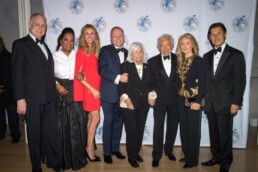
The inaugural award was given to Oprah Winfrey 10 years from when she was first awarded The Elie Wiesel Humanitarian Award. Ms. Winfrey was a beloved friend of Professor Wiesel’s and accompanied him to Auschwitz in 2006 in a widely televised special. The award was given to Ms. Winfrey in recognition for her work with her South African young women through the Oprah Winfrey Leadership Academy for Girls.
The Young Friends Award goes to notable role models who have shown that talent, intelligence, and charity go hand in hand. The goal of this award is to highlight young leaders who strive to make a positive impact on society and their generation.
- Natalie Portman was honored with this award for her focused efforts on education as well as philanthropic efforts, most notably with FINCA International, non-profit organization with a mission to alleviate poverty through lasting solutions that help people build assets, create jobs and raise their standard of living.
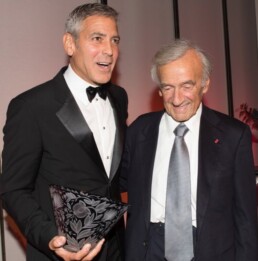
In recognizing artists not only for their intrinsic talent but for their concern for others, the Arts for Humanity Award strives to highlight the important role performers play in global well-being. Honorees reflect the essential values which the Foundation holds dear.
- A gifted actor and producer, recipient Tom Hanks proves that success can have far-reaching rewards. His charitable work helps people around the world. His belief in the importance of remembering the past combined with his efforts on behalf of those in need create an exemplary humanitarian. His work has included contributions to the Pearl Harbor Memorial Fund, ONE Campaign, National Space Society, Got Your 6 Campaign, and the New Orleans World War II Museum, among many others.
- George Clooney is a strong First Amendment advocate with a deep commitment to humanitarian causes. In 2006, Clooney and his father, Nick, went to drought-stricken Darfur, Africa, to film the documentary “Journey to Darfur.” Clooney’s work on behalf of Darfur relief led to his addressing the United Nations Security Council with Elie Wiesel and he continues to campaign against the genocide taking place there.
Past Work
Outreach
Darfurian Refugee Program
Using our Beit Tzipora Centers as a model, the Foundation started an after-school program in the fall of 2007 for refugees from the genocide in Darfur who have been given safe haven in Israel. The program, operated through the Bialik-Rogozin School in Tel-Aviv, provides after-school English and Hebrew training, computer courses, tutoring, arts and crafts, and counseling to the children. Language classes and other courses, as well as counseling, are also offered to their parents. By providing these refugees the attention and educational support they so desperately need, the Foundation is extending its efforts related to the genocide in Darfur from advocacy to helping Darfurian children adjust to their new lives in Israel.
